Trustees vote to approve new Tarrant tax rate
The TCC board of trustees recently adopted a new tax rate reduction of 1.8 cents.
Ronnie Watkins, executive director of finance and administrative services, presented the tax rate plan to the board at the Sept. 13 work session.
He reiterated that he and his team worked hard to keep the taxpayers in mind, as well as the college, when developing the new tax resolution.
“We are a community college and we have listened to our community. We do understand the burden of the taxpayers,” he told the board. “I’m also reminded of the mission of Tarrant County College as well. Tarrant County College provides affordable and open access to quality teaching and learning. To me, that’s value. We have quality learning at an affordable price. That’s good value. That’s what we hold onto.”
This rate is the 2023 tax rate based on the appraised value of a property by the Tarrant Appraisal District. Each fiscal year, the board votes on a new rate for TCC. For the 2023-24 fiscal year, it is 11.217 cents per $100 in valuation.
Previous exemptions to this rate continue to exist for specific groups. Those with disability have $3,000 excluded from their appraisal value, and people over 65 years-of-age have the first $50,000 removed from the appraisal value.
The homestead exemption was added in June, as well. It excludes 1% of an appraisal value with a $5,000 minimum.
Some taxpayers are pleased with the new change compared to last year’s tax rate. Tarrant County resident Daniel Bennett commented at the board work session Sept. 13 asking the trustees to be cautious about their tax decisions based on the “bloated” tax rates from last year.
He also urged the trustees of the Tarrant Appraisal District to take a no confidence vote due to the problematic practices he felt the chief appraiser used in moving money around to stay within budget.
“I appreciate you reviewing the board in its current state and
New play ignites excitement
Drama based on historical fire takes to the stage
NINA BANKS managing editor nina.banks@my.tccd.edu
The SE theater is set to premiere “Volume of Smoke” from Oct. 4 to Oct. 6.
The play is based on the Richmond Theater fire in 1811. SE student DaShaun Ellis plays the Blacksmith who is based on Gilbert Hunt, a freed Black man who played a large role in saving countless lives.
“He is a Black man who actually became a registered blacksmith in Richmond,” Ellis said. “He saved — I believe — 36 people from the fire at the Richmond Theater. He’s just a hero.” The fire was caused when a lamp touched a set piece.
Inadequacies of the building’s construction exacerbated the fire.
Director Bradley McEntire cited that the incident created greater awareness of fire safety.
“It also started the first serious conversations about building codes and the possibility of regulating the building of much safer structures.
For instance, the Richmond Theater had main doors that opened inward. It had very narrow aisles. The stairs leading down from the box seats were apparently never weight tested and constructed in a shoddy manner. All of this was quite a hazard in a fire. These kinds of things were considered more thoroughly from that point onward.”
Although the incident was 200 years ago, Director Bradley McEntire was drawn to the
humanity of the story.
“I am fascinated by how we, both as individuals and as a larger community, deal with catastrophe,” McEntire said. “ This play features a real-life disaster, one of the most devastating of America’s early years as a young nation. The repercussions trickled outward.”
“Volume of Smoke” portrays vignettes of how survivors and victims responded to the fires.
“The play explores how we cope when we come face to face with big tragic events such as this,” McEntire said. “Sometimes we meet catastrophe with courage, sometimes with debilitating fear. Sometimes with outrage, sometimes with resignation. Sometimes it reveals our selfishness, sometimes our heroic side. It really does stressSee Smoke, page 2
taking that vote,” he said.
TAD’s Chief Appraiser Jeff Law resigned Sept. 1 after the Tarrant County Commissioner Court passed a no confidence vote against Law. At the Sept. 21 board meeting, a no confidence vote on TAD was moved but it did not pass. With elections for TAD starting, the TCC board of trustees can cast five nominations.
Trustee Shannon Wood moved to nominate Vince Puente, seconded by Trustee Gwendolyn Morrison. Along with that, Trustee Laura Forkner Pritchett moved to nominate Gary Losada, seconded by Wood. Both motions carried.
To wrap up the tax talk, the board discussed replacing the previous Finance and Audit Committee with an Internal Audit Committee to increase engagement with the Internal Auditor and District’s office. It will be governed by the Internal Audit Committee Charter.
General Counsel Carol Bracken explained this topic to the trustees at the Sept. 13 work session.
“The other purpose of this is to review with the auditor substantiated reports that come in on our anonymous fraud and abuse hot line. Because a lot of the audit process – and certainly also the view of these substantiated complaints can be very sensitive – involves information about personnel,” she said to the board.
At the Sept. 21 board meeting, the motion was carried, and President Teresa Ayala appointed three board members to the committee: Leonard Hornsby as committee chair and Wood and Kenneth Bahr as committee members. The next TCC board meeting will be held Oct. 26 at 6 p.m..
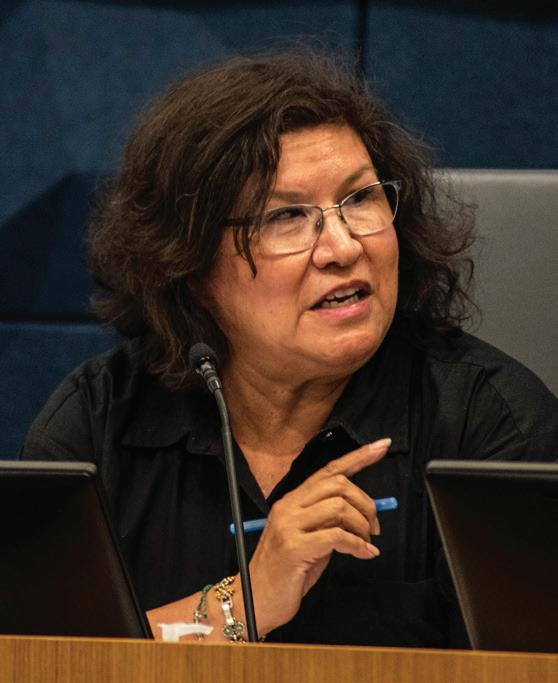
Search for health care insurance proves to be anything but simple
Smith hospital’s eligibility outreach project coordinator for Tarrant County in Medical Home 101, a presentation aimed to help students in their quest for health insurance.
Imagine getting into an accident and breaking an arm or a leg? Do you have health insurance to help, or would you have to choose between a broken limb or a broken bank account?
Angela Hall, TR coordinator for health services said she’s seen students injured and refusing to seek healthcare because they don’t have insurance. So, TR health services partnered with Kalondia McCain, John Peter
“We don’t prescribe medications, we don’t diagnose, we don’t treat,” she said. “And so, we often have to refer students out to a community partner, and then they tell us they don’t have health insurance.”
Hall said that oftentimes young adults who are no longer covered under their parents’ insurance wonder what their next step for insurance can be if they’re not
employed somewhere that offers it.
“It can become expensive quickly,” she said.
An outstanding billing that comes from a healthcare provider can be more affordable with financial assistance programs, she said.
“As taxpayers, we are paying for the hospital district system so it’s good that students become aware of what their resources are.”
After the presentation by McCain, JPS put out a table giving out resources to sign up for programs such as JPS Connection, which she explained
as a financial assistance program through enrollment eligibility at Tarrant County hospitals. The JPS table included applications for the program as well as a flyer about making the most out of a doctor’s appointment.
“We assist Tarrant County residents with copays and deductibles. We know during this economic time it can be hard financially,” she said.
McCain said that the JPS program is a last resort. They want to ensure that everyone applies for any state or federally funded program that is available before
enrolling in their program.
Though JPS doesn’t have a college student specific program, they have one for anyone who resides within Tarrant County and meets their program criteria. McCain also said that they have seen an increase in applications because people want to be more health conscious. She recommended yearly health check ups for anyone without insurance.
“It’s important to have some source of health coverage resources to assist,” she said. “Hopefully, through the financial assistance See Medical, page 2

Wednesday, September 27, 2023 – Volume 37 Issue 6 @tccthecollegian • collegian.tccd.edu Family or Self - How an immigrant daughter chooses self or familial respect Page 3 Dumb Money The power of stock enthusiasts on Reddit forums Page 4 Bottoms A redemption story about queer social outcasts Page 4 Dangerous drivers Texans on the road spell nothing but trouble Page 4 Tampon Tax Menstrual products are too expensive. Page 5 Anime and Japanese Club NE Campus students gather together to enjoy anime Page 2
DISTRICT HOPE SMITH editor-in-chief hope.smith393@my.tccd.edu SOUTHEAST
TRINITY RIVER
OLLA MOKHTAR campus editor olla.mokhtar@my.tccd.edu Alex Hoben/The Collegian NE students Daequan Jones (right) and Alan Gutierrez (left) grasp each others arms as they practice with their company, Movers
Unlimited, in the NHPE gym. They were preparing for the
Fort Worth Dance Festival on Friday, Sept. 22. See Dance is Unlimited, page 6
Alex Hoben/The Collegian Board President Teresa Ayala talks at the board meeting.
Anime club brings TCC students together
Japanese culture celebrated in NE organization’s weekly meetings
groups of people and I think it’s important to learn more about other cultures and know more about everyone.”
Japan, you’ll know the significance behind why they dress and talk the way they do.”
TCC Anime and Japanese culture club members share their opinions on the benefits of students becoming culturally aware.
Cultural awareness is a concept that has grown in relevancy over the years, as has interests with Eastern culture by Westerners. NE Campus has capitalized on this with the Anime and Japanese culture club, a place where students can go and learn about Japan together. The club, led by club president Mena Kennedy, meets Fridays at 1 p.m. to observe and celebrate Japan’s unique traditions and offerings.
Before the start of their most recent meeting, club members discussed what it means to have cultural awareness.
“I think cultural awareness is important,” NE student and club secretary Ethan Kuioth said. “Texas is actually quite a diverse place and populations are full of various
NE student and club member Dylan Bacchus felt similarly regarding the importance of being well-versed in other cultures.
“It [cultural awareness] expands people’s views on how they see the world,” Bacchus said. “They’re not so closed off in their own little pocket.”
Despite this, Bacchus said the desire to learn about other cultures will always depend on the person.
“Some people enjoy to experience new things and some people are not accustomed to change,” he said. “I think it’d be better if everyone were more open to experiencing new things. Not even just Japanese culture but any culture.”
NE student and club member Ki Boyd said that learning foreign cultures can benefit people by making them more open-minded.
“Learning different cultures makes a more well-rounded person,” Boyd said. “Like, if you go to

Kuioth said there’s social benefits to learning about new and foreign cultures.
“I feel like anyone can benefit from learning about any culture, because there’s always some linking factors between all of them,” he said. “Learning more about all of them can lead to you being more accepting and kind of understand the differences between different groups of people.”
He said there’s a sense of community from the club, a “familial vibe,” that can be felt that comes with broadening your cultural awareness and learning new skills.
“I think empathy is something people can learn [in the club] and sort of social skills,” he said. “Honestly, the whole point of having a club and an environment is to make friends with new people and find a place that you feel you kind of belong in on campus and have a group of people that you kind of get to know and potentially hang out with
program with JPS Connection, we can be that resource.”
TR student Arely Felix said she has seen many people, including her own family members, refuse treatment because they can’t afford it.
“It makes me very scared to go to hospitals,” she said. “I have gone to them and most of the time I just get the bills, but I don’t have any money to pay them. Most of the money I get from school is from financial aid.”
Felix said that because many college students don’t even have a credit card to help them out, she understands why some are wary of care.
“It’s very money-driven,” she said. “I understand that if we do universal healthcare, it would increase taxes, but most of the time we don’t know where our taxes go.
$0 FROM MATH CLASS TO THE MALL
more. That’s what we try to go for is a close vibe like that.”
Kennedy detailed some upcoming club events and activities such as a Japanese movie night festival event, a cosplay-themed event called Cosplay Café and field trips to special anime conventions and
about these events and the Anime and Japanese Culture Club, contact club advisor Paige Duffy at paige.duffy@ my.tccd.edu or club president
Kennedy at mena.kennedy@ my.tccd.edu.
care insurance plans. Under it, all Canadian residents have reasonable access to medically necessary hospital and physician services without paying out-of-pocket. The federal government is responsible for its funding under the Canada Health Act.
For the people responsible for America’s care, she had a message.
She compared America’s health care to that of Canada’s and said that she doesn’t believe the U.S. will see much of a difference against Canada where they have universal healthcare.
According to the official website of the Government of Canada, their publicly funded healthcare system, Medicare has 13 provincial and territorial health
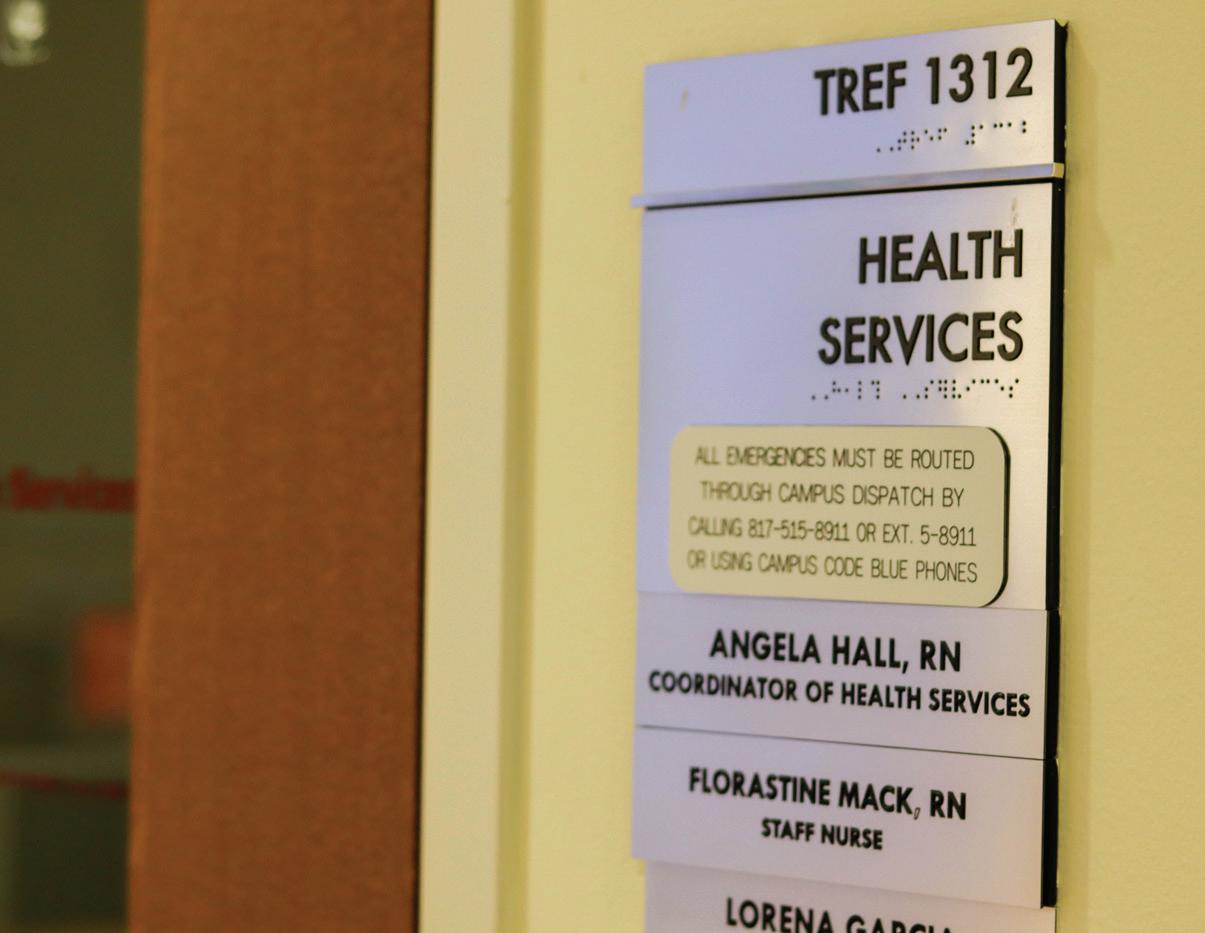
Smoke
“Would you take the healthcare? If you needed it, would you take that program with a lowpaying salary?”
TCC does not offer collegesponsored student health insurance. However, as a courtesy, it recommends Edsure for student healthcare insurance and CareNow Urgent Care as well as North Texas Area Community Health centers for local healthcare clinics as per the college’s website.

(continued from page 1)
test our most human qualities.”
Each actor plays several characters in the play. SE student Dyan Cruz plays six roles and cited the switches as the hardest aspect of her performance.
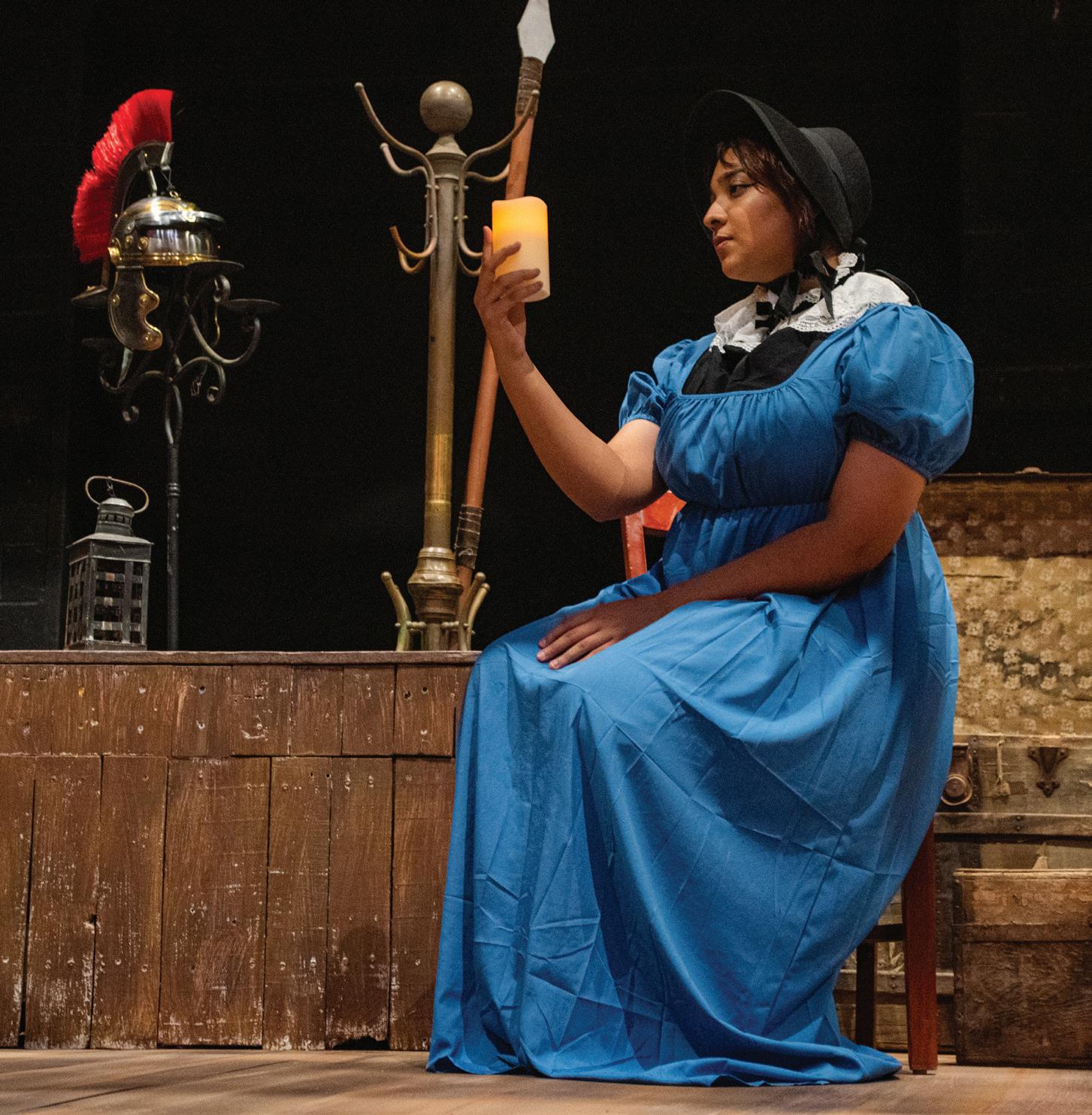
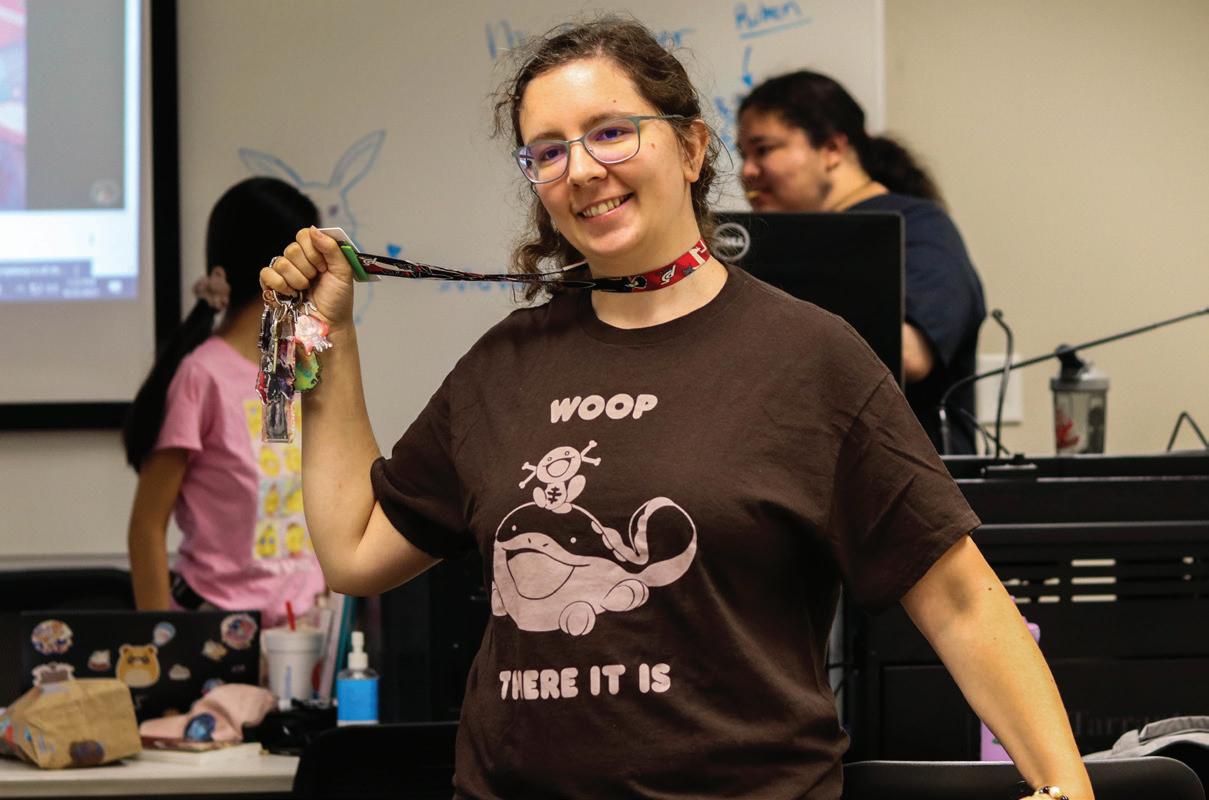
“I think it’s just hard on the fact that we play multiple characters so we can’t focus in on one,” Cruz said. “We have to constantly change and adapt, whether that be an accent, a voice, some sort of movement that character has.”
Speaking in the vocabulary of people in the 1800s was an adjustment for SE student Ri-Shay Washington.
“How they spoke in that time period is pretty different than how we speak,” Washington said. “We typically word things a certain way and then like ‘Oh no,
that’s not how it’s said.’ The language is very different.”
In addition to vocabulary, SE student Haley Ferguson learned about the culture of the time period.
“It was a big deal to go to the theater,” Ferguson said. “It was a really big deal. Going to the theater was an event, you have to get in your best dress.”
SE student Isara Al-Hilo urged the future audience to remember that the Richmond Theater fire was a historical event.
“The most important thing to takeaway from this is to remember,” Al-Hilo said. “These were real people. Especially with the Blacksmith, that was a real dude. Just be respectful of the people who died.”
Japanese gardens.
learn
Hope Smith/The Collegian NE English instructor Paige Duffy shows off her Wooper, the Pokemon, shirt during the Anime Club’s weekly meeting. 2 • Wednesday, September 27, 2023 NEWS No matter how you crunch the numbers, students ride FREE on all Trinity Metro buses, TEXRail, ZIPZONE, and TRE to CentrePort Station. All you need is your TCC student ID! Learn more at RIDETRINITYMETRO.org/TCC
To
more
Mena
FOR
BOATNER campus editor xavier.boatner@my.tccd.edu
XAVIER
1)
Medical (continued from page
Alex Hoben/The Collegian The Health Services office on TR Campus. Health Services offers different methods of wellness referrals including STI testing.
Alex Hoben/The Collegian
SE student Isara Al-Hilo poses on-stage with one of the many candles on the set in her costume as the Reverend’s Wife. Al-Hilo plays five parts in the play.
It makes me very scared to go to hospitals.
NORTHEAST
Arely Felix TR student
Immigrant daughter’s journey to self-discovery and love
OLLA MOKHTAR campus editor olla.mokhtar@my.tccd.edu
For some, it takes years to immigrate. Luckily for her, it took her only one.
NE student Mena Kennedy came to the U.S. dreaming of a better life. However, their experiences may not have the same idea as their dreams.
Starting the immigration process from Vietnam at just 11 years old, Kennedy said the reason she immigrated was because her mom remarried. She said it usually takes years to immigrate into the U.S., but because her mother was getting married, it only took one year.
Recalling the process, she said she remembers the embassies kept her and her mother there to keep them from going forward with the process. They were trying to immigrate legally, and it was still hard.
“I was looking forward to a new life because the chance for me to succeed as a kid who was obviously neurodivergent in a country like Vietnam was super low,” she said. “I could not keep up with everything considering I went to one of the top schools in the city I was in, and they were so competitive. They were always taking exams, and my mental health was declining. I ended up doing better in the U.S. because I had more freedom to choose what I could learn and what I chose to pursue.”
Once she attended school in America, she experienced culture shock with her first encounter with racism.
“Surprisingly, the kid that was bullying me was also a person of color,” she said. “It was obvious that he learned it from somewhere and was trying to take it out on me because I was new. I didn’t know how to speak his language. I didn’t know how to defend myself, so he targeted me because of that. I just felt alone most of the time because I didn’t know what people were saying about me most of the time, but when I learned I zoned back out because they weren’t saying anything nice.”







Kennedy said she felt she was forced to assimilate to the environment under pressure. But the assimilation, once set in place, had its drawbacks when she realized people didn’t like her because of where she was from.
“I needed to realize that it wasn’t my fault,” she said. “It was a result of their prejudice, what their parents taught them, what their immediate or distant families taught them, what their friends taught them, what their teachers might have taught them.”
Despite this, she said she ended up meeting a lot of friends that helped her navigate middle school which she is grateful for. Kennedy said she felt so alone all the time, not being able to understand what was being said about her.
“I’ve learned how to stand up for myself,” she said. “I’ve been bullied most of my life and have been taught to take it and move on, but now I know how to properly set boundaries to say ‘No,’ to let people be upset if they’re not happy with it.”













Currently, Kennedy is 19 and has severed ties with her biological family because she stayed steadfast within her boundaries. She explained
that in her family, her parents were stuck in their ways, hindering her mental health and self-esteem so it made her think of family in a different way.

She said that her boundaries, wishes and desires were not respected due to toxic and illogical cultural traditions and mindsets her family didn’t agree with.
“I can lose my family in the blink of an eye,” she said. “But when I seek out a family of my own, I get to choose to walk away or not. Even though I didn’t choose them, I get to choose to walk away or at least not deal with them.”
She said her “found family,” consisting of friends, family friends and others were different from her biological one because they gave her one thing the other didn’t - respect.
through,” Moncivais said. “I think she has a lot of strength for who she is, and she deserves to be praised for that.”














They said meeting her was the best thing that could’ve happened and that it was a good memo ry to look back on.
“I think meeting her taught me I don’t have to be silly all the time,” they said. “I could have serious friendships and I could be a better person too.”
Through her interest in anime, Kennedy met Paige Duffy, Anime and Japanese Culture Club adviser and NE English instructor. They met two years ago when she joined the club as the secretary and now has stepped up to become the president.
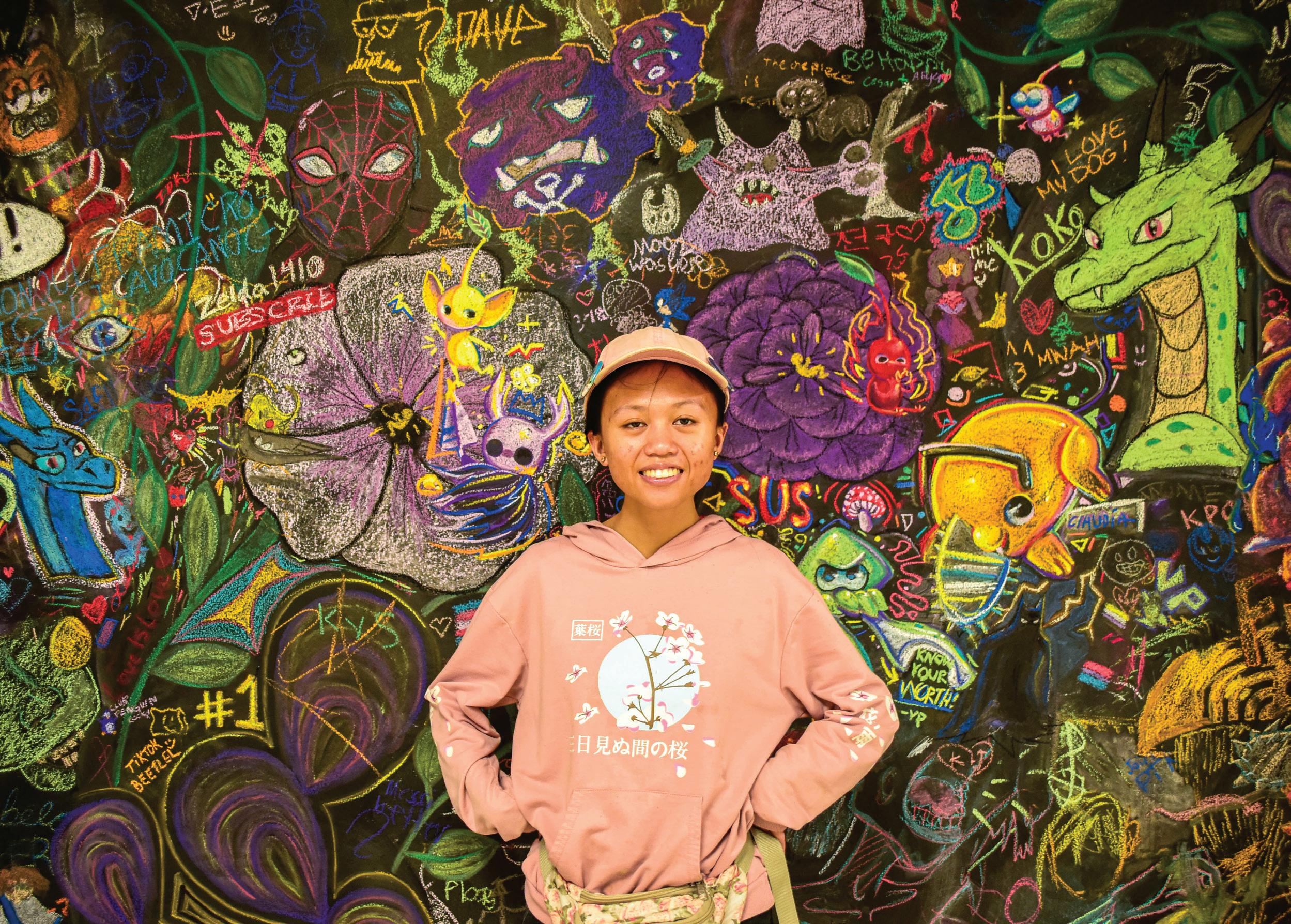
Describing her as hard-working, dedicated, creative and focused, Duffy said they appreciate the fact that she stepped up to her position with out previous experience and acclimated to being president very well.
“I really appreciate her honesty with things, she’s very upfront,” they said. “She’s always like, ‘This is what needs to be said. This is what we need to do. We need to make sure we’re communicating stuff clearly.’ She is such a hard worker, a really good inspiration for everyone working in the club too.”
Duffy said Kennedy confided in her with personal issues and helped her financially as well.
“I think that’s what makes her so impres sive,” they said. “It’s that she has all this going on and she’s still showing up and doing this com pletely optional thing that she likes doing.”
“Basic respect is there for me as a human being,” she said. “There’s little to no power imbalance when it comes to basic respect, love and understanding, and I just experienced a lot of that at home. That’s all I’ve known and when I meet the people, I consider family and friends now, I’m still not used to it. It’s definitely something I should’ve gotten beforehand, before seeking out friendships, relationships. When I met my boyfriend, I realized ‘Oh, this is how it’s supposed to be. I’m not supposed to be ordered around and pressured into doing something I don’t like.’”
Not respecting personal choices or the choice to remove herself from any situation is a recipe for an abusive relationship, which no one taught her.
“I was supposed to be this loyal, good Asian daughter,” she said. “And it’s like I can be that only if I can receive my love and support at the same time. It feels like in our culture, we don’t treat children like human beings. We treat them like little trophies.”
She said that in her culture parents often carry their children around, boasting about how well they’re doing with sports, school, clubs or jobs. She said parents end up not respecting their children’s privacy, constantly asking who they’re with, where they are and what they are doing.
“That’s conditional love,” she said. “ “You’re conditioning your children to work hard for your love even though they deserve it just for existing.”
One thing she appreciates about a member of her “found family” is the fact that her and NE student Ruben Moncivais can always point out each other’s faults while still being respectful of each other. They met senior year of high school and have been best friends ever since.
“I appreciate her ability to work through and persevere through a lot of things she’s gone
Kennedy believes she has more genuine friends now because there no cultural stigmas and pressures around staying loyal to them.
“I’m overall more confident in my own choices and in my own resolve because growing up being suppressed all my life makes me not care if people disapprove of me.”
Wednesday, September 27, 2023 • 3
Photos by Alex Hoben/The Collegian NE student Mena Kennedy stands in front of the chalkboard wall that is available for students and staff to draw on in NFAB.
...It feels like in our culture we don’t treat children like human beings, we treat them like little trophies.
Mena Kennedy NE student
Kennedy is pursuing a degree in art, and she owns a small business selling her art.
Illustrations by Markus Meneses/The Collegian
‘Dumb Money’: Redditors rejoice at movie
GameStop short sqeeze fiasco shows the
power
of dumb money
I was in junior year of high school when the GameStop short squeeze happened. I had a vague understanding of how it occurred but not the consequences. My brother on the other hand was urging my mom frantically to buy stock. When I saw the trailer for “Dumb Money,” I was intrigued. For one, we are only two years removed from the ordeal. And two, the cast absolutely stacked. Paul Dano plays the main character Keith Gill, aka Roaring Kitty. Shailene Woodley plays his wife Caroline Gill, Seth Rogen is Gabe Plotkin and Pete Davidson practically plays himself.
OLLA MOKHTAR campus editor olla.mokhtar@my.tccd.edu
Turns out January 2021 was chock full of events that permanently changed America. Gill bought 53,000 dollars worth of GameStop stock and shared his thoughts on YouTube and the reddit forum r/wallstreetbets. People bought in, causing a short squeeze and extensive damage for hedge funds that didn’t account for the uptake. The movie closely follows the actual story with a few addendums. For one, we see the impact of Gill on his followers. They consist of a single mother who has two kids, two college students in hundreds of thousands of dollars in debt from student loans and a GameStop worker with a hundred dollars to his name. All avid followers of Roaring Kitty and frequenters of the reddit r/wallstreetbets, they take a gamble and invest in GameStop.
If you have a rudimentary understanding of the stock market, do not let that stop you from watching the movie. It definitely helps, but you can still understand what’s happening and why.
The movie takes place during 2020 and 2021 which of course means rewatching the pandemic. Usually, I do not like seeing movies or TV that incorporated the pandemic into their storylines, but in this case it was unavoidable. However, I think they pulled it off without making it too jarring. It almost made me nostalgic seeing people wearing masks below their nose and dividers at restaurants.
This movie pulled off the mundane and captured Gill as an everyman so effectively. The whole time, you can’t help but feel compelled to root for Gill and everyone who
invested in the stock. I was also pleasantly surprised by how accurately they captured the Reddit energy, for lack of better words.
My biggest qualm with the movie is that I think it came out too soon. Granted, the initial release was limited and will have a wide release on Sept. 29, but the movie has only grossed around $300,000. But I think if they waited until the GameStop incident wasn’t fresh in our minds, it could’ve been more successful.
Post “Dumb Money,” I might hedge some bets. After all, I like the stock.
and untalented’ students prove they can fight as well
They’re not hated because they’re gay, they’re hated because they’re “gay, ugly and untalented.”
This film follows high school students Josie, played by Ayo Edebiri and PJ played by Rachel Sennot who are labeled as the ‘losers’ not because they’re gay but because they’re “gay, ugly and untalented,” as repeated by both characters multiple times. In a quest to find love successfully they also encounter the importance of friendship with each other.
They both have crushes on Isabel, who is in a relationship with Jeff, played by Nicholas Galizine and Brittany respectively.
One night at the carnival the school hosted before the beginning of the school year, PJ decided that night was the night they both would start talking and dating their crushes. While Josie is very skeptical of the plan and isn’t confident, she could get one word in with Isabel, she goes along with it and accompanies PJ to the fair.
The plan failed miserably, and they decided to head home.
But when Isabel catches Jeff staring at one of the teachers and grazing her hips they start fighting. She storms off with Jeff chasing after her and enters Josie’s car. Josie inches forward with her car and touches Jeff in the knee but because he is the appraised football star that everyone pampers, he acts as if she seriously injures him.
PJ and Josie both get in trouble at school the next day with their peers and the principal as they idolize him and, in an effort, to get out of trouble, PJ says they were practicing for their ‘self-defense’ club.
This time their plan works and suddenly they start lying about how they learned to fight in juvenile detention that their crushes find inspiring. Word circles around and before they know it, they’re in over their heads teaching a bunch of girls, including Isabel and Brittany, ‘self-defense.’
Jeff’s partner in crime, Tim, catches onto their lie and works to expose them, all the while the group slowly becomes a haven for the girls to confide in. They also learn to
work together after a threat towards the football team awaits them.
The movie poses as a comedy however it largely circulates topics such as female friendships, female and male solidarity, the porn industry, being bicurious, cheating in romantic relationships and much more which is beyond impressive for a 90-minute movie.

The two that caught my attention were the focus on female friendships and the subtle mention of the porn industry.
The idea of girls talking about struggles with their home life, stalking and being assaulted. Was incorporated into the stereotypical characters of cheerleader, skateboard girl, nerd, etc, allowing me as the viewer to interpret them as multifaceted. I loved that their problems concerning themselves were put at the forefront of the movie and their romantic conquests were labeled as secondary.
Even though their lie was exposed, and the group became angry, they still found a way to put pettiness aside and work together.
It emphasized that there was more to life than boys or girls, even though it is fun to have.
It is over dramatic but thoughtful, insanely unrealistic but sheds light on realworld topics that can’t be explained without the word genius. It’s essentially a front for what some people called a romantic comedy turned queer.
Not to mention Galitzine’s insane range of acting abilities that came to light, I didn’t think he would perform well since he’s known for more serious characters like Prince Henry from “Red, White & Royal Blue” and Luke from “Purple Hearts”. But he acted like being a jock was his life’s mission and I appreciated his obvious commitment to the role.
In a scene where two girls are kissing to make a distraction, comments like “I’m not gay, I just like gay porn”, “This is nothing like a porno, wait is porn real? “Came from the characters that acted like the dumb and popular kids, hinting at real-world subjects but never outright discussing them.
It reminded me of the novel “1984” by George Orwell with its delivery and cliff hangers, both creators mention and tell stories about subjects and give it up for the watchers to think about later. It feels like this era of cinema is leaning towards Orwell’s way of storytelling.
These topics and ideas have been introduced into cinema with “Barbie” and its interpretation of female friendship and others with the porn industry but none that I have seen so far had a comedic spin to it.
Of the movies I’ve seen, none concluded the film with a light-hearted feel to it. So, if you’re looking for a spin on “High School Musical” the queer and 2023 way, you should most definitely watch this.

MOVIE REVIEW
4 • Wednesday, September 27, 2023 ENTERTAINMENT
MOVIE REVIEW
NINA BANKS managing editor nina.banks@my.tccd.edu
Photo Courtesy of Sony Pictures
Paul Dano plays Keith Gill in “Dumb Money.” The movie premiered Sept. 8th and featured Pete Davidson, Shailene Woodley, Nick Offerman and Clancy Brown.
Photo Courtesy of Metro-Goldwyn-Mayer
Barely grazing Jeff, JP, Isabel and Josie realise their doom as they’ve just injured their school’s most esteemed football star. “Bottoms” was released in theatres Aug. 25 and is available on Amozon Prime.
‘Gay, ugly
Menstrual care has long been neglected
Effective Sept. 1, the sales tax for “certain family care items” has been eliminated. These items include diapers, baby wipes and menstrual products.
For advocates of accessible menstrual care, the bill has been a long time coming. Proponents of the removal of the tax on menstrual products, also referred to as the “tampon tax,” believe it is the first step in decreasing the stigma of periods and making menstrual care more accessible. Although the taboo surrounding menstruation has lessened in recent years, people who menstruate are still faced with period poverty.
According to the Journal of Global Health Reports, period poverty is “defined as a lack of access to menstrual products, hygiene facilities, waste management, and education.”
Homeless people who menstruate are hit hardest by period poverty. Not only is shelter and food hard to come by, but basic hygiene can be even harder to achieve. A box of 34 Tampax Pearl tampons are $7.97. Fashioning a free makeshift pad compared to eight dollars seems like the fiscally smarter choice. But long term, it is not a hygienic solution and can lead to urinary tract infections or yeast infections.
For higher income individuals that live in liberal areas, period poverty may not affect them as
VIEWPOINTS
harshly compared to the latter. While removing taxes on menstrual products is a step in the right direction, proper menstrual education is often an overlooked facet of period poverty.
Many conservative states do not offer
comprehensive education about the menstrual cycle; primarily focusing on the functions of the internal reproductive system.
The tampon tax demonstrates implicit gender bias on who we

consider more worthy of getting adequate medical treatment.
Wisconsin is among the 24 states where the tampon tax is intact.
Viagra, however, is not taxed. The selective banning of products implies
that menstrual care is a luxury and that men and people with external genitalia take precedence over women and people who menstruate.
Global efforts have been made to alleviate the gap period poverty has created. Spain has led the effort in Europe with paid time off during an individual’s menstrual cycle, and Scotland is the first country to make period products free for all.
For people with medical conditions like endometriosis, periods can be an excruciating time of the month. Time off, birth control and affordable menstrual products, if not free, could ease the inevitable pain they suffer. It’s the very least we could do.
Half the population deals with menstrual cycles and yet we treat them like periods don’t exist. Time after time, people who menstruate are expected to perform at peak performance while undergoing cramps, bleeding and fluctuating hormones.
For many people in the workforce, taking time off isn’t a feasible option. So, they have to grin and bear through the workday with no accommodations besides an Advil in a first aid box.
To ignore the pain of your peers simply because it’s how society has operated forever is not an excuse to continue the neglect. People who menstruate deserve accessible care to basic hygiene.
Consider the complications of transportation for people
signal and watch for other drivers, but I was completely at the mercy of these other drivers if they chose to pick up their phone to send a text.
Taking the highway for some people is a regular day to and from work expecting to see an accident on the side.
But that’s the Texas highways. And, in some ways, it’s a little morbid. It’s almost expected now that an accident is bound to happen on the highway, it’s just a matter of time.
“Texas has bad drivers.”
This phrase has been uttered by nonTexan and Texan drivers often. Texans nod to each other in unison thinking of the Dallas traffic, distracted drivers and speed demons.
I say it to myself watching a car make the decision to take up both lanes in front of me.
This, however, is not a baseless claim. According to Forbes, Texas has the worst drivers, and. Louisiana follows after. Texas also has the third highest number of drunk drivers involved in fatal crashes, as well as the ninth highest number of fatal car crashes due to distracted driving.
Why is this? There is almost – without a doubt, actually – no reason why I should be going the speed limit while a Ford F-150 is so close to me it could smell my thoughts in the far- right lane.
To pair with these facts, Texas is also the state with the highest speed limit of 85 mph in certain rural interstates.
For new Texan drivers, this can prove to be a worrisome challenge. I remember my first time behind the wheel was in my mom’s car, and I was terrified to simply scratch it.
I could try all I wanted to follow all the road laws to a T, remember my turn
According to the Texas Department of Transportation, a person was killed every 1hr and 57 minutes based on reported crashes in 2022. One person was injured every two minutes and nine seconds, and one reportable crash occurs every 57 seconds.
If we want change, it helps to discourage jokes on drunk driving. Recently, there has been an uptick of “fetch me my car keys!” And other jokes while people allude to being under the influence on TikTok and other social media platforms. It’s all jokes, of course, but the internet is free to anyone, and one person’s joke can easily be another’s dare.

Dark humor is humor until someone actually gets hurt. It’s not funny after that. In situations like those, it’s important to distinguish from the get-go, that if the group is going to get involved with drinking that car keys are set aside and out of reach.
Targeting an issue like this would be a monster of a task, but addressing it for what it is would be a good first step. Defensive driving courses in Texas offer a chance to have fully comprehensive education on being a safe driver, and I highly recommend people are fully aware of how much certain road law offenses cost as an incentive to be smart.
The Collegian is a weekly student publication serving the Tarrant County College District. Editorial statements and advertisements do not necessarily reflect the opinion of the TCC administration.

Letters to the paper should be 150 words or less, free from libel and poor taste and include the writer’s Colleague ID or telephone number (the numbers will not be published). Letters may be brought to The Collegian office (NCAB 1124A, NE
EDITOR-IN-CHIEF Hope Smith
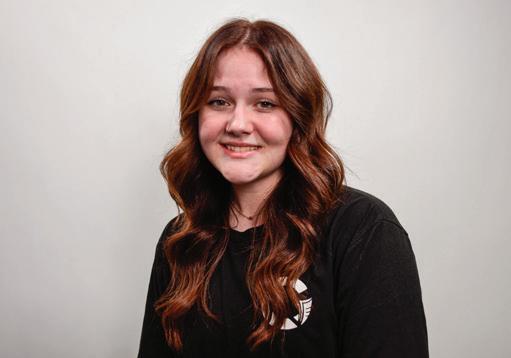
MANAGING EDITOR Nina Banks
America is an automobile utopia, chock full of highways and parking lots that run on into the horizon - and it’s irritating.
It’s great for the vast majority of Americans and even better for young adults who’re fresh out of high school with the disposable income to afford their own automobile. It seems freeing for sure, but as someone who doesn’t have the luxury, it’s a major inconvenience, like, one-hundred and seven percent of the time.
It wouldn’t be a problem at all if America had more widely accepted means of public transportation methods, but that’s not the case.
A considerable chunk of the country has been built and rebuilt on the back of the automotive industry. What’s the reason for the lack of public transportation like buses and railways? What’s up with the lack of bike lanes? Why is it required to be in your automobile to (efficiently) get anywhere?
It may sound nit picky, I understand that, but really, what excuse does the country have? Our communities are built to facilitate cars before human beings and that’s a problem.
To be blunt, I think America is far too dependent on cars (in case it wasn’t obvious). This isn’t me saying to erase cars from our daily lives or anything outlandish like that, since there are amazing benefits to having them, but something needs to be done
Campus),or mailed to:
The Collegian 828 Harwood Road Hurst, TX 76054
Office: 817-515-6391 email: collegian.editor@tccd.edu
regarding the lack of multiple methods of public transportation.
If you don’t have a vehicle in modernday America, you’re more or less under house arrest. A person can only walk in sweltering Texas heat for so long before throwing their hands in the air and collapsing on the ground after suffering a heatstroke.
There are so many great things that could come from increasing the amount of public transportation systems in America, it’s not even funny. We live in a time that’s all about being inclusive and all-encompassing, yet there’s a portion of Americans who have few viable transportation options outside of automobiles.
Just stop and think of the potential benefits. People can get around easier, do things, buy things, stimulate the economy or whatever. How is that not a good thing? Not only that, but the health of individual communities will only improve since people from smaller neighborhoods could travel easier without breaking the bank for an automobile.
Think of all the road congestion. Think of the traffic, followed by long waits and anxious drivers. Now think of what could happen if more people were able to travel without the need for an automobile? An increase in public transportation could improve road congestion and help clear up traffic on clogged roadways.
The overall mobility of Americans would increase exponentially if there were buses and cabs in rural communities, or trains, trams and streetcars in urban areas. Letting people have a choice is all I’m getting at here. America is supposed to be “the land of the free” and all that, but our freedom of choice is severely limiting.
Roll out the trains, buses and cabs, for goodness’s sake.
TCC is an equal opportunity institution that provides educational and employment opportunities on the basis of merit and without discrimination because of race, color, religion, sex, age, national origin, veteran status or disability.
ADVISERS
Chris Whitley Lori Dann
PRODUCTION MANAGER Stacy Luecker
ILLUSTRATORS Tj Favela Markus Meneses CAMPUS EDITORS NORTHEAST Xavier Boatner SOUTHEAST Keyla Holmes TRINITY RIVER Olla Mokhtar
Jerry Swinney Dominick Martinez PHOTOGRAPHER Ariel DeSantiago ADVERTISING COORDINATOR Nathan Hailu
PHOTO/MULTIMEDIA EDITOR Alex Hoben
DESIGNERS
Meet the Staff EDITORIAL
Markus Meneses /The Collegian
Letter Policy
Texas drivers are infamous for their bad, reckless driving
•
ProfeSSional Staff
@tccthecollegian
collegian.tccd.edu
Wednesday, September 27, 2023 • 5 OPINION
HOPE SMITH editor-in-chief hope.smith393@my.tccd.edu
XAVIER BOATNER campus editor xavier.boatner@my.tccd.edu
NE dance company embraces its emotions through craft
vide their own input. Lopez views the time as a safe space.
That’s how I let out all my frustration, stuff I didn’t talk about or express.”
In a swirl of complementary colors, NE student Leonel Lopez performs alongside his peers in a Korean contemporary dance.


NE Campus is home to Movers Unlimited. The pre-professional dance company has been under the instruction of dance professor Kihyoung Choi since 2011.
“It started to flourish and become bigger in, I think, 2012,” Choi said. “We had 13 members in the first year. And now, we have 42 members. So it’s going really, really big.”
The company’s mission is to “promote humanity, unity and diversity through the art of dance.” In addition to dance, community service is a large part of the group. Since 2012, they have raised approximately $12,000 and frequently volunteer and lead dance master classes.
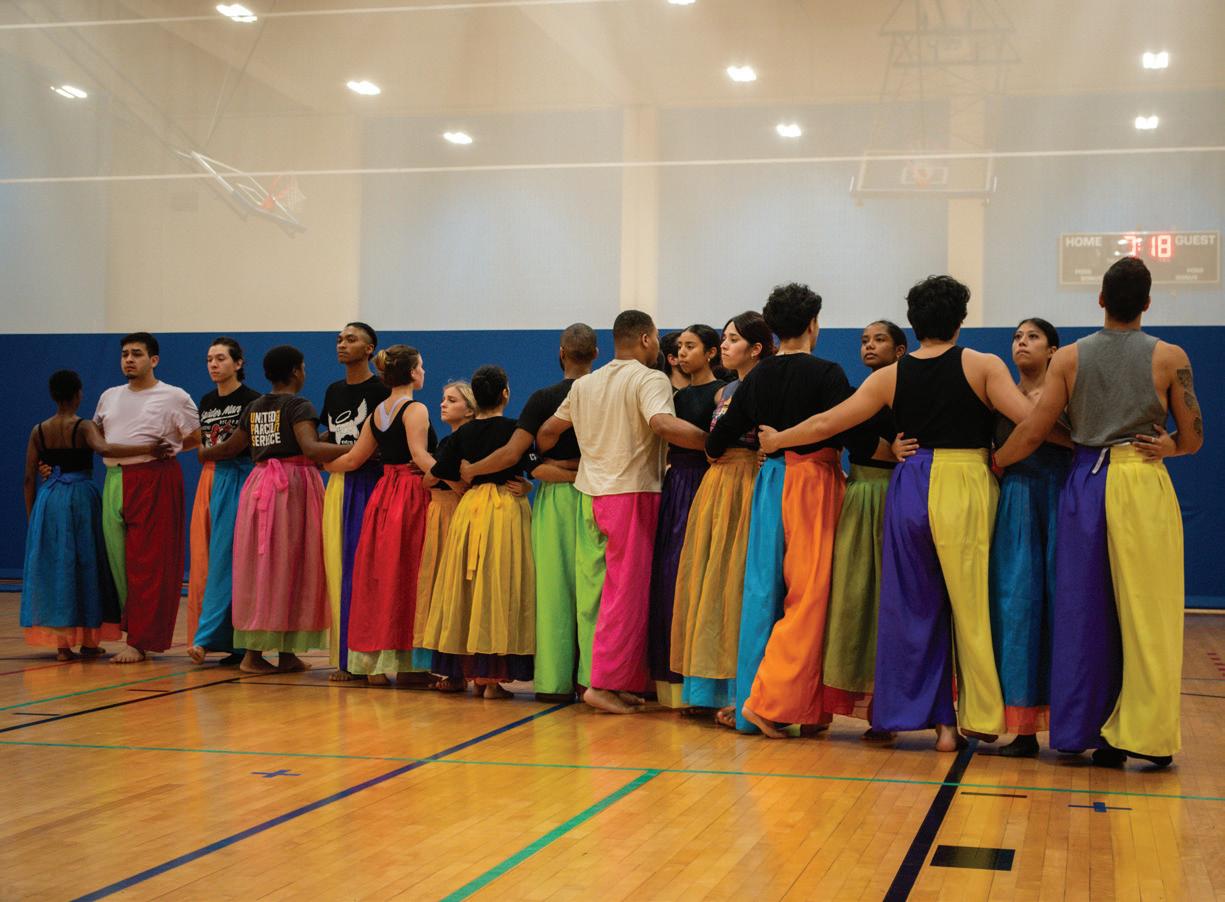
“Our company does the dance but also does a lot of community service,” Choi said. “We focus a lot on community service. We give back to the community because that’s really important. We are giving back to the community through art and dancing.”
Every year, Choi choreographs a piece across the span of two semesters. They start with “circle talks,” a time when members of the company gather to pro-
“We talk very openly about some of our deepest and most concerning issues and things we’re facing not only here on campus but in our personal lives as well,” Lopez said. “Part of that is talking about what we wanted this piece to mean to each of us.”
The most recent piece they created, “Yeon: Bridging our Paths,” was inspired by Choi’s Buddhist upbringing. She created the piece with life and loss in mind. Yeon translates to lotus flower in Korean, a fixture of Buddhism.
“When I see the visual inspiration of this piece, it is a lotus flower,” Choi said. “The lotus flower comes from muddy water. So it’s like humans. We are going through, but we still flourish. We are struggling but are still going somewhere.”
Movers Unlimited was invited to perform at the Fort Worth Dance Festival on Sept. 23. In preparation, the company modified “Yeon: Bridging our Paths,” shortening the dance to 10 minutes from the initial 30 minutes. Dancing allowed NE student Rachel Ramsarran to channel her emotions.

“When I did this dance, I just felt completely exposed,” Ramasarran said. “When I think about it, all these raw emotions come out. And when I’m performing, I would just scream. It wasn’t even that I was tired. That’s just what I was feeling.
They were fifth in the lineup at the festival, following several professional dance companies. They received the first standing ovation of the night, even moving some to tears. NE dance adjunct instructor Najwa Seyedmorteza said she understands why the audience may have such a visceral reaction to the dance.
“We want the audience to see themselves in us while we’re dancing,” Seyedmorteza said. “There’s a point in the dance of vulnerability that comes out, and it’s inevitable. It’s just going to happen because of how tired and exhausted we are. I think it’s a very beautiful thing to see. And I think that’s why our audience is very touched by our work because I think at one point or another as humans we are in a place of vulnerability that is showcased in the art of dance.”
Looking forward, their next dance is already in production. Based on the moon, Movers Unlimited will premiere the dance on Dec. 1.
“In the Korean idea of the moon, the moon is much more powerful than the sun,” Choi said. “When we are hoping for something, when you are trying to conceive but you cannot have the baby, you go in the dark under the moon and you pray to whichever god you believe in. It’s about perseverance.”
6 • Wednesday, September 27, 2023
NINA BANKS managing editor nina.banks@my.tccd.edu
Photos by Alex Hoben/The Collegian
NE student Nathan Burgess (center) practices with Movers Unlimited Dance Company before the Fort Worth Dance Festival on Sept. 22.
The performers come together in a line during the beginning of the “Yeon: Bridging Our Paths.” The piece features 25 dancers.
NE students Christopher Garcia swings Vanessa Lamas during the second half of the “Yeon: Bridging Our Paths” performance.
Movers Unlimited members Christopher Garcia and Shamila Issa pose together, practicing for their performance later in the week.

































